英语常用同义词近义词
- 格式:doc
- 大小:69.00 KB
- 文档页数:13
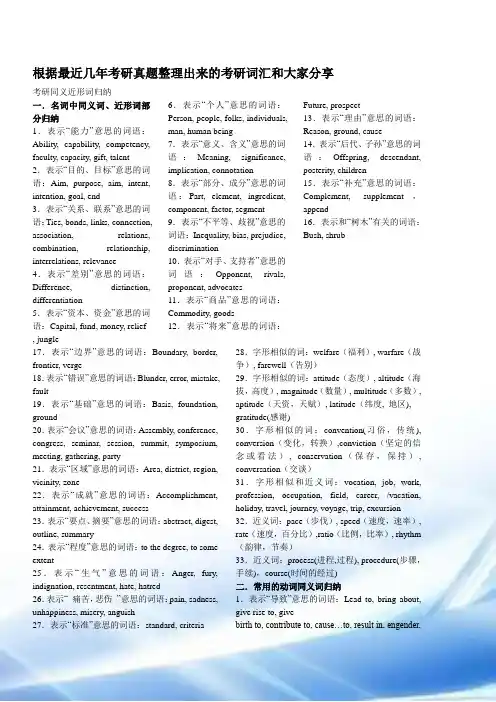
根据最近几年考研真题整理出来的考研词汇和大家分享考研同义近形词归纳一.名词中同义词、近形词部分归纳1.表示“能力”意思的词语:Ability, capability, competency, faculty, capacity, gift, talent 2.表示“目的、目标”意思的词语:Aim, purpose, aim, intent, intention, goal, end3.表示“关系、联系”意思的词语:Ties, bonds, links, connection, association, relations, combination, relationship, interrelations, relevance4.表示“差别”意思的词语:Difference, distinction, differentiation5.表示“资本、资金”意思的词语:Capital, fund, money, relief 6.表示“个人”意思的词语:Person, people, folks, individuals,man, human being7.表示“意义、含义”意思的词语:Meaning, significance,implication, connotation8.表示“部分、成分”意思的词语:Part, element, ingredient,component, factor, segment9.表示“不平等、歧视”意思的词语:Inequality, bias, prejudice,discrimination10.表示“对手、支持者”意思的词语:Opponent, rivals,proponent, advocates11.表示“商品”意思的词语:Commodity, goods12.表示“将来”意思的词语:Future, prospect13.表示“理由”意思的词语:Reason, ground, cause14.表示“后代、子孙”意思的词语:Offspring, descendant,posterity, children15.表示“补充”意思的词语:Complement, supplement,append16.表示和“树木”有关的词语:Bush, shrub, jungle17.表示“边界”意思的词语:Boundary, border, frontier, verge18.表示“错误”意思的词语:Blunder, error, mistake, fault19.表示“基础”意思的词语:Basis, foundation, ground20.表示“会议”意思的词语:Assembly, conference, congress, seminar, session, summit, symposium, meeting, gathering, party21.表示“区域”意思的词语:Area, district, region, vicinity, zone22.表示“成就”意思的词语:Accomplishment, attainment, achievement, success23.表示“要点、摘要”意思的词语:abstract, digest, outline, summary24.表示“程度”意思的词语:to the degree, to some extent25.表示“生气”意思的词语:Anger, fury, indignation, resentment, hate, hatred26.表示“ 痛苦,悲伤”意思的词语:pain, sadness, unhappiness, misery, anguish27.表示“标准”意思的词语:standard, criteria 28.字形相似的词:welfare(福利), warfare(战争), farewell(告别)29.字形相似的词:attitude(态度), altitude(海拔,高度), magnitude(数量), multitude(多数), aptitude(天资,天赋), latitude(纬度, 地区), gratitude(感谢)30.字形相似的词:convention(习俗,传统), conversion(变化,转换),conviction(坚定的信念或看法), conservation(保存,保持), conversation(交谈)31.字形相似和近义词:vocation, job, work, profession, occupation, field, career, /vacation, holiday, travel, journey, voyage, trip, excursion 32.近义词:pace(步伐), speed(速度,速率), rate(速度,百分比),ratio(比例,比率), rhythm (韵律,节奏)33.近义词:process(进程,过程), procedure(步骤,手续),course(时间的经过)二.常用的动词同义词归纳1.表示“导致”意思的词语:Lead to, bring about, give rise to, givebirth to, contribute to, cause…to, result in, engender,render, prompt, cause, make, result from(起因于)2.表示“面对、偶遇”意思的词语:Confront, be confronted with, face, be faced with, meet with, encounter.3.表示“集中于”意思的词语:Center on, focus on, concentrate on4.表示“对付、处理”意思的词语:Deal with, cope with, handle, tackle, manipulate,5.表示“消失”意思的词语:Disappear, vanish, fade, perish6.表示“减少、增加”意思的词语:Diminish, lessen, decrease, drop, reduce, fall, /accumulate, increase, rise, soar, rocket7.表示“依靠、依赖”意思的词语:Rely on(upon), depend on(upon), count on (upon), rest on(upon) 8.表示“变化”意思的词语:Change, turn, vary/range, alter, transform, shift, convert.9.表示“指控”意思的词语:Charge with, accuse of, sue for, condemn, denounce, prosecute10.表示“克服、战胜”意思的词语:Overcome, conquer, defeat,11.表示“获得、得到”意思的词语:Achieve, obtain, get, accomplish, earn, attain, secure, acquire, gain 12.表示“抓住”意思的词语:Catch, seize, capture, catch hold of, grab13.表示“限制”意思的词语:Limit, confine, restrict. 14.表示“强迫”意思的词语:compel, constrain, force, oblige。
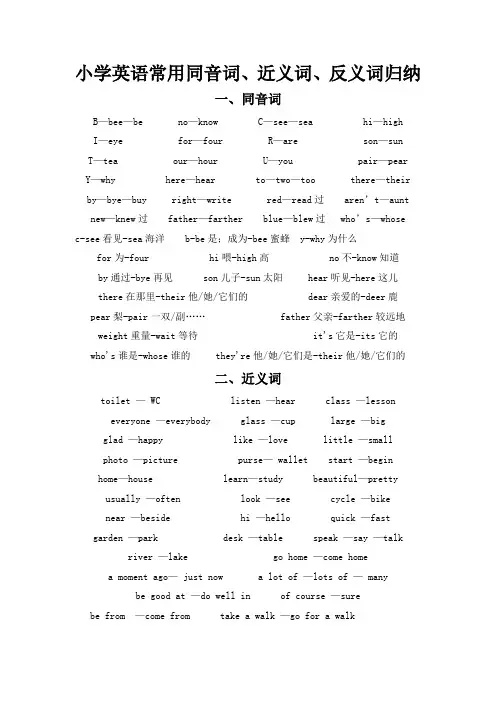
小学英语常用同音词、近义词、反义词归纳一、同音词B—bee—be no—know C—see—sea hi—highI—eye for—four R—are son—sun T—tea our—hour U—you pair—pear Y—why here—hear to—two—too there—their by—bye—buy right—write red—read过 aren’t—aunt new—knew过 father—farther blue—blew过 who’s—whosec-see看见-sea海洋 b-be是;成为-bee蜜蜂 y-why为什么for为-four hi喂-high高 no不-know知道by通过-bye再见 son儿子-sun太阳 hear听见-here这儿there在那里-their他/她/它们的 dear亲爱的-deer鹿pear梨-pair一双/副…… father父亲-farther较远地weight重量-wait等待 it's它是-its它的who's谁是-whose谁的 they're他/她/它们是-their他/她/它们的二、近义词toilet — WC listen —hear class —lesson everyone —everybody glass —cup large —bigglad —happy like —love little —smallphoto —picture purse— wallet start —beginhome—house learn—study beautiful—prettyusually —often look —see cycle —bikenear —beside hi —hello quick —fast garden —park desk —table speak —say —talk river —lake go home —come homea moment ago— just now a lot of —lots of — manybe good at —do well in of course —sure be from —come from take a walk —go for a walktake a bus —by bus would like —want look for— find三、反义词big大的----- small小的 bad坏的----- good好的bright明亮的----- dark黑暗的 black黑的----- white白的beautiful美的----- ugly丑的 cold冷的----- hot热的cool凉爽的----- warm温暖的 come来----- go去cry哭----- laugh笑 clever聪明的----- stupid笨的different不同的-- same 相同的 difficult难的-- easy容易的dirty脏的----- clean干净的 day白天----- night夜晚early早的----- late迟的 fast快的----- slow慢的glad高兴的--- sad悲伤的 inside里面的---- outside外面的in里面----- out外面 large大的----- little小的left左----- right右 quiet安静的----- noisy吵闹的new新的----- old旧的 loose松的----- tight紧的like喜欢----- hate厌恶 open开----- close关quick快的----- slow慢的 stand站----- sit坐short矮的----- tall高的 short短的----- long长的thick厚的----- thin薄的 thin瘦的----- fat肥的up向上------ down向下 wrong错的----- right对的weak弱的----- strong强壮的 young年轻的----- old年老的。
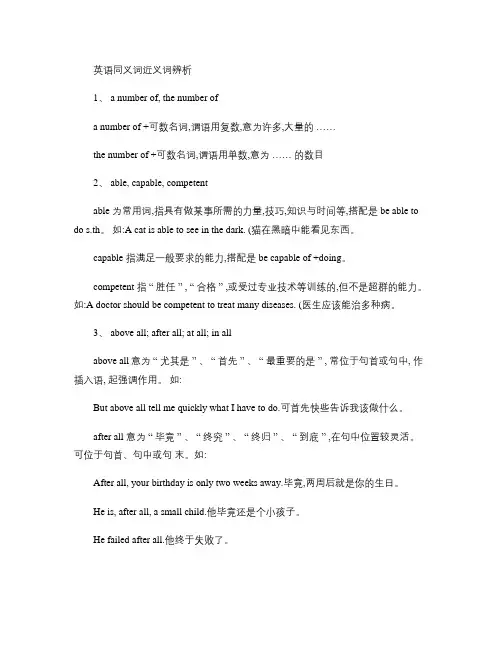
英语同义词近义词辨析1、 a number of, the number ofa number of +可数名词,谓语用复数,意为许多,大量的……the number of +可数名词,谓语用单数,意为…… 的数目2、 able, capable, competentable 为常用词,指具有做某事所需的力量,技巧,知识与时间等,搭配是 be able to do s.th。
如:A cat is able to see in the dark. (猫在黑暗中能看见东西。
capable 指满足一般要求的能力,搭配是 be capable of +doing。
competent 指“ 胜任” , “ 合格” ,或受过专业技术等训练的,但不是超群的能力。
如:A doctor should be competent to treat many diseases. (医生应该能治多种病。
3、 above all; after all; at all; in allabove all意为“ 尤其是” 、“ 首先” 、“ 最重要的是” , 常位于句首或句中, 作插入语, 起强调作用。
如:But above all tell me quickly what I have to do.可首先快些告诉我该做什么。
after all 意为“ 毕竟” 、“ 终究” 、“ 终归” 、“ 到底” ,在句中位置较灵活。
可位于句首、句中或句末。
如:After all, your birthday is only two weeks away.毕竟,两周后就是你的生日。
He is, after all, a small child.他毕竟还是个小孩子。
He failed after all.他终于失败了。
at all 用于否定句时,意为“ 丝毫;根本” ,用于疑问句时意为“ 究竟;到底” ,用于条件句时, 常译为“ 当真;实在” 。
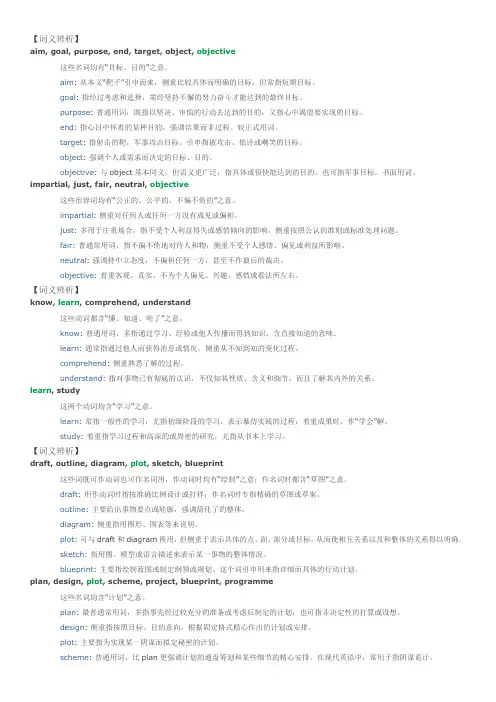
【词义辨析】aim, goal, purpose, end, target, object, objective这些名词均有“目标、目的”之意。
aim: 从本义“靶子”引申而来,侧重比较具体而明确的目标,但常指短期目标。
goal: 指经过考虑和选择,需经坚持不懈的努力奋斗才能达到的最终目标。
purpose: 普通用词,既指以坚决、审慎的行动去达到的目的,又指心中渴望要实现的目标。
end: 指心目中怀着的某种目的,强调结果而非过程。
较正式用词。
target: 指射击的靶,军事攻击目标。
引申指被攻击、批评或嘲笑的目标。
object: 强调个人或需求而决定的目标、目的。
objective: 与object基本同义,但语义更广泛,指具体或很快能达到的目的,也可指军事目标。
书面用词。
impartial, just, fair, neutral, objective这些形容词均有“公正的、公平的、不偏不倚的”之意。
impartial: 侧重对任何人或任何一方没有成见或偏袒。
just: 多用于庄重场合,指不受个人利益得失或感情倾向的影响,侧重按照公认的准则或标准处理问题。
fair: 普通常用词,指不偏不倚地对待人和物,侧重不受个人感情、偏见或利益所影响。
neutral: 强调持中立态度,不偏袒任何一方,甚至不作最后的裁决。
objective: 着重客观、真实,不为个人偏见、兴趣、感情或看法所左右。
【词义辨析】know, learn, comprehend, understand这些动词都含“懂、知道、明了”之意。
know: 普通用词,多指通过学习、经验或他人传播而得到知识,含直接知道的意味。
learn: 通常指通过他人而获得消息或情况,侧重从不知到知的变化过程。
comprehend: 侧重熟悉了解的过程。
understand: 指对事物已有彻底的认识,不仅知其性质、含义和细节,而且了解其内外的关系。
learn, study这两个动词均含“学习”之意。
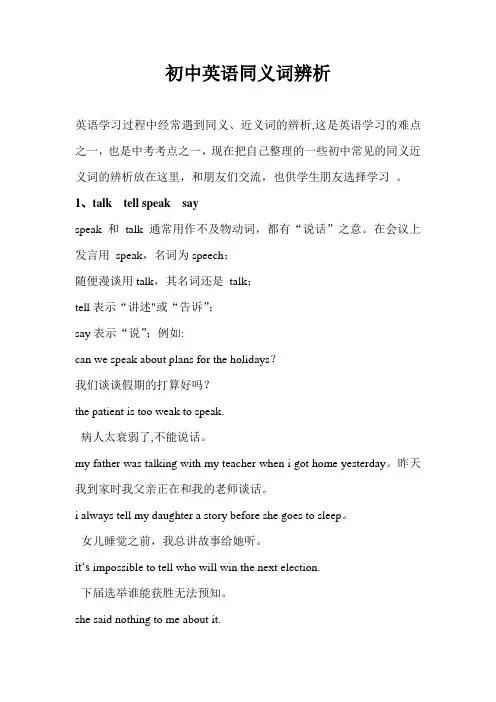
初中英语同义词辨析英语学习过程中经常遇到同义、近义词的辨析,这是英语学习的难点之一,也是中考考点之一,现在把自己整理的一些初中常见的同义近义词的辨析放在这里,和朋友们交流,也供学生朋友选择学习。
1、talk tell speak sayspeak 和talk 通常用作不及物动词,都有“说话”之意。
在会议上发言用speak,名词为speech;随便漫谈用talk,其名词还是talk;tell表示“讲述"或“告诉”;say表示“说”;例如:can we speak about plans for the holidays?我们谈谈假期的打算好吗?the patient is too weak to speak.病人太衰弱了,不能说话。
my father was talking with my teacher when i got home yesterday。
昨天我到家时我父亲正在和我的老师谈话。
i always tell my daughter a story before she goes to sleep。
女儿睡觉之前,我总讲故事给她听。
it‘s impossible to tell who will win the next election.下届选举谁能获胜无法预知。
she said nothing to me about it.关于这一点,她什么也没有对我讲.*speak 当及物动词用时,宾语一般是语言或词语之类的词。
如: does anyone speak english here?这儿有人会说英语吗?2、good well nicegood 形容词,好的,合适的,新鲜的,擅长的。
well 作形容词时,指"(身体)健康的”;还可用作副词,修饰动词。
nice形容词,美好的,令人愉快的,可爱的,特指取悦感官的事物。
she is good at english。
她擅长英语。
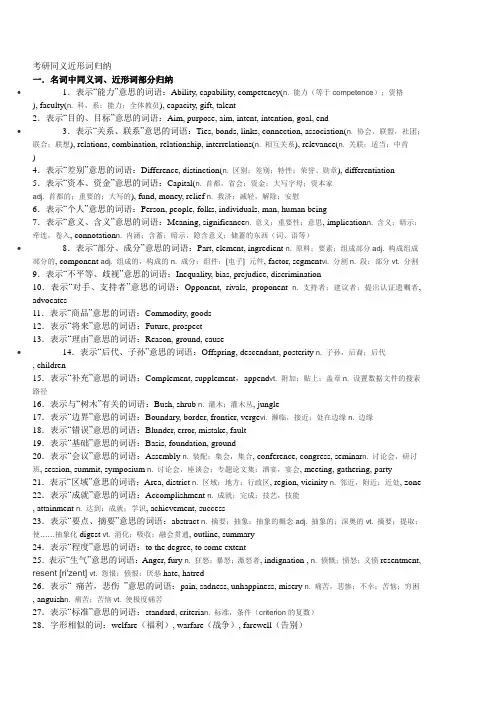
考研同义近形词归纳一.名词中同义词、近形词部分归纳•1.表示“能力”意思的词语:Ability, capability, competency(n. 能力(等于competence);资格), faculty(n. 科,系;能力;全体教员), capacity, gift, talent2.表示“目的、目标”意思的词语:Aim, purpose, aim, intent, intention, goal, end•3.表示“关系、联系”意思的词语:Ties, bonds, links, connection, association(n. 协会,联盟,社团;联合;联想), relations, combination, relationship, interrelations(n. 相互关系), relevance(n. 关联;适当;中肯)4.表示“差别”意思的词语:Difference, distinction(n. 区别;差别;特性;荣誉、勋章), differentiation5.表示“资本、资金”意思的词语:Capital(n. 首都,省会;资金;大写字母;资本家adj. 首都的;重要的;大写的), fund, money, relief n. 救济;减轻,解除;安慰6.表示“个人”意思的词语:Person, people, folks, individuals, man, human being7.表示“意义、含义”意思的词语:Meaning, significance n. 意义;重要性;意思, implication n. 含义;暗示;牵连,卷入, connotation n. 内涵;含蓄;暗示,隐含意义;储蓄的东西(词、语等)•8.表示“部分、成分”意思的词语:Part, element, ingredient n. 原料;要素;组成部分adj. 构成组成部分的, component adj. 组成的,构成的n. 成分;组件;[电子] 元件, factor, segment vi. 分割n. 段;部分vt. 分割9.表示“不平等、歧视”意思的词语:Inequality, bias, prejudice, discrimination10.表示“对手、支持者”意思的词语:Opponent, rivals, proponent n. 支持者;建议者;提出认证遗嘱者, advocates11.表示“商品”意思的词语:Commodity, goods12.表示“将来”意思的词语:Future, prospect13.表示“理由”意思的词语:Reason, ground, cause•14.表示“后代、子孙”意思的词语:Offspring, descendant, posterity n. 子孙,后裔;后代, children15.表示“补充”意思的词语:Complement, supplement,append vt. 附加;贴上;盖章n. 设置数据文件的搜索路径16.表示与“树木”有关的词语:Bush, shrub n. 灌木;灌木丛, jungle17.表示“边界”意思的词语:Boundary, border, frontier, verge vi. 濒临,接近;处在边缘n. 边缘18.表示“错误”意思的词语:Blunder, error, mistake, fault19.表示“基础”意思的词语:Basis, foundation, ground20.表示“会议”意思的词语:Assembly n. 装配;集会,集合, conference, congress, seminar n. 讨论会,研讨班, session, summit, symposium n. 讨论会,座谈会;专题论文集;酒宴,宴会, meeting, gathering, party21.表示“区域”意思的词语:Area, district n. 区域;地方;行政区, region, vicinity n. 邻近,附近;近处, zone 22.表示“成就”意思的词语:Accomplishment n. 成就;完成;技艺,技能, attainment n. 达到;成就;学识, achievement, success23.表示“要点、摘要”意思的词语:abstract n. 摘要;抽象;抽象的概念adj. 抽象的;深奥的vt. 摘要;提取;使……抽象化digest vt. 消化;吸收;融会贯通, outline, summary24.表示“程度”意思的词语:to the degree, to some extent25.表示“生气”意思的词语:Anger, fury n. 狂怒;暴怒;激怒者, indignation , n. 愤慨;愤怒;义愤resentment, resent [ri'zent] vt. 怨恨;愤恨;厌恶hate, hatred26.表示“ 痛苦,悲伤”意思的词语:pain, sadness, unhappiness, misery n. 痛苦,悲惨;不幸;苦恼;穷困, anguish n. 痛苦;苦恼vt. 使极度痛苦27.表示“标准”意思的词语:standard, criteria n. 标准,条件(criterion的复数)28.字形相似的词:welfare(福利), warfare(战争), farewell(告别)29.字形相似的词:attitude(态度), altitude(海拔,高度), magnitude(数量), multitude(多数), aptitude (天资,天赋), latitude(纬度, 地区), gratitude(感谢)30.字形相似的词:convention(习俗,传统), conversion(变化,转换),conviction(坚定的信念或看法), conservation(保存,保持), conversation(交谈)31.字形相似和近义词:vocation, job, work, profession, occupation, field, career, /vacation, holiday, travel, journey, voyage, trip, excursion32.近义词:pace(步伐), speed(速度,速率), rate(速度,百分比),ratio(比例,比率), rhythm (韵律,节奏)33.近义词:process(进程,过程), procedure(步骤,手续),course(时间的经过)二.常用的动词同义词归纳1.表示“导致”意思的词语:Lead to, bring about, give rise to, give birth to, contribute to, cause…to, result in, engender, render, prompt, cause, make, result from(起因于)2.表示“面对、偶遇”意思的词语:Confront, be confronted with, face, be faced with, meet with, encounter.3.表示“集中于”意思的词语:Center on, focus on, concentrate on4.表示“对付、处理”意思的词语:Deal with, cope with, handle, tackle, manipulate, vt. 操纵;操作;巧妙地处理5.表示“消失”意思的词语:Disappear, vanish, fade, perish vi. 死亡;毁灭;腐烂;枯萎•6.表示“减少、增加”意思的词语:Diminish, lessen, decrease, drop, reduce, fall, /accumulate vi. 累积;积聚, increase, rise, soar, rocket vi. 飞驰,飞快地移动;迅速增加7.表示“依靠、依赖”意思的词语:Rely on(upon), depend on(upon), count on (upon), rest on(upon)8.表示“变化”意思的词语:Change, turn, vary/range, alter, transform, shift, convert. vi. 转变,变换;皈依;改变信仰9.表示“指控”意思的词语:Charge with, accuse of, sue for, condemn, denounce, prosecute vi. 起诉;告发;作检察官10.表示“克服、战胜”意思的词语:Overcome, conquer, defeat,11.表示“获得、得到”意思的词语:Achieve, obtain, get, accomplish, earn, attain, secure adj. 安全的;无虑的;有把握的;稳当的vt. 保护;弄到;招致;缚住, acquire, gain12.表示“抓住”意思的词语:Catch, seize, capture, catch hold of, grab13.表示“限制”意思的词语:Limit, confine, restrict. vt. 限制;约束;限定14.表示“强迫”意思的词语:compel, constrain, force, oblige vt. 迫使;强制;赐,施恩惠;责成15.表示“责怪”意思的词语:blame, condemn, reproach n. 责备;耻辱, scold。
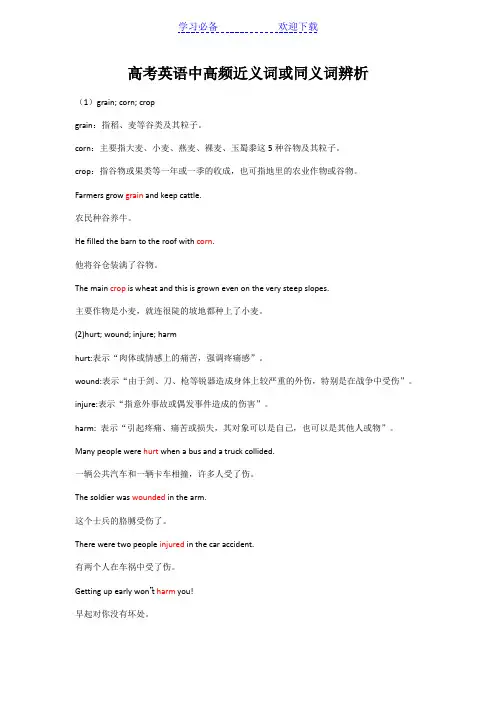
高考英语中高频近义词或同义词辨析(1)grain; corn; cropgrain:指稻、麦等谷类及其粒子。
corn:主要指大麦、小麦、燕麦、裸麦、玉蜀黍这5种谷物及其粒子。
crop:指谷物或果类等一年或一季的收成,也可指地里的农业作物或谷物。
Farmers grow grain and keep cattle.农民种谷养牛。
He filled the barn to the roof with corn.他将谷仓装满了谷物。
The main crop is wheat and this is grown even on the very steep slopes.主要作物是小麦,就连很陡的坡地都种上了小麦。
(2)hurt; wound; injure; harmhurt:表示“肉体或情感上的痛苦,强调疼痛感”。
wound:表示“由于剑、刀、枪等锐器造成身体上较严重的外伤,特别是在战争中受伤”。
injure:表示“指意外事故或偶发事件造成的伤害”。
harm: 表示“引起疼痛、痛苦或损失,其对象可以是自己,也可以是其他人或物”。
Many people were hurt when a bus and a truck collided.一辆公共汽车和一辆卡车相撞,许多人受了伤。
The soldier was wounded in the arm.这个士兵的胳膊受伤了。
There were two people injured in the car accident.有两个人在车祸中受了伤。
Getting up early won‟t harm you!早起对你没有坏处。
(3)affair; thing; matter; businessaffair:意为“事情、事件”, 含义较广,泛指已做或待做的事。
复数affairs一般指商业事务及政府的日常事务,如财政管理、外交事务等。
thing:意为“事情、事物”,不管大事小事、好事坏事均称为thing,一般不能专指事务。
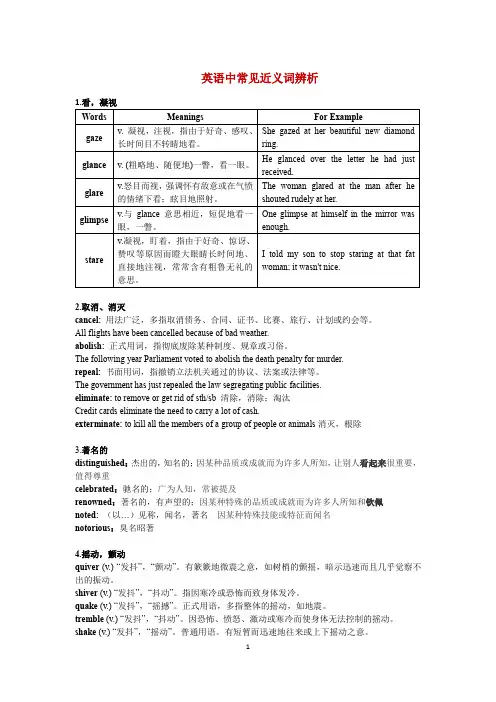
英语中常见近义词辨析2.取消、消灭cancel:用法广泛,多指取消债务、合同、证书、比赛、旅行、计划或约会等。
All flights have been cancelled because of bad weather.abolish: 正式用词,指彻底废除某种制度、规章或习俗。
The following year Parliament voted to abolish the death penalty for murder.repeal: 书面用词,指撤销立法机关通过的协议、法案或法律等。
The government has just repealed the law segregating public facilities.eliminate: to remove or get rid of sth/sb 清除,消除;淘汰Credit cards eliminate the need to carry a lot of cash.exterminate: to kill all the members of a group of people or animals消灭,根除3.著名的distinguished:杰出的,知名的;因某种品质或成就而为许多人所知,让别人看起来很重要,值得尊重celebrated:驰名的;广为人知,常被提及renowned:著名的,有声望的;因某种特殊的品质或成就而为许多人所知和钦佩noted: (以…)见称,闻名,著名因某种特殊技能或特征而闻名notorious:臭名昭著4.摇动,颤动quiver (v.) “发抖”,“颤动”。
有簌簌地微震之意,如树梢的颤摇,暗示迅速而且几乎觉察不出的振动。
shiver (v.) “发抖”,“抖动”。
指因寒冷或恐怖而致身体发冷。
quake (v.) “发抖”,“摇撼”。
正式用语,多指整体的摇动,如地震。
tremble (v.) “发抖”,“抖动”。
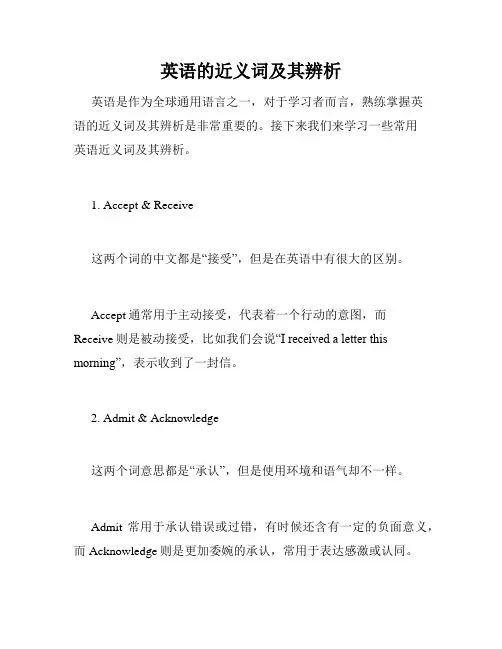
英语的近义词及其辨析英语是作为全球通用语言之一,对于学习者而言,熟练掌握英语的近义词及其辨析是非常重要的。
接下来我们来学习一些常用英语近义词及其辨析。
1. Accept & Receive这两个词的中文都是“接受”,但是在英语中有很大的区别。
Accept通常用于主动接受,代表着一个行动的意图,而Receive则是被动接受,比如我们会说“I received a letter this morning”,表示收到了一封信。
2. Admit & Acknowledge这两个词意思都是“承认”,但是使用环境和语气却不一样。
Admit常用于承认错误或过错,有时候还含有一定的负面意义,而Acknowledge则是更加委婉的承认,常用于表达感激或认同。
3. Advice & Advise这两个词看上去非常相似,但是意思却截然不同。
Advice是名词,表示建议或忠告,而Advise则是动词,表示给予建议、指导或忠告。
4. Allude & Refer这两个词都有“指”、“提及”的意思,但是使用环境不同。
Allude通常用于暗示或影射,而Refer则是更加直接的指向。
5. Assist & Help这两个词意思十分接近,但是用法上还是有区别的。
Assist更倾向于以积极的方式帮助,比如我们会说一位志愿者帮助他人,并且通常有一定的力量或技能支持。
而Help则是可以包括任何形式的帮助,不一定是积极的方式。
6. Appraise & Evaluate这两个词意思都是“评估”或“评价”,但是使用场合不同。
Appraise通常用于物品的估价或评估,而Evaluate更倾向于评价一个事件或过程。
比如,我们可以说:“The teacher appraised the book”,表示老师对这本书估价;而如果用Evaluate的话,就会表示老师对整个过程有一个评价。
当然,以上只是英语近义词的冰山一角。
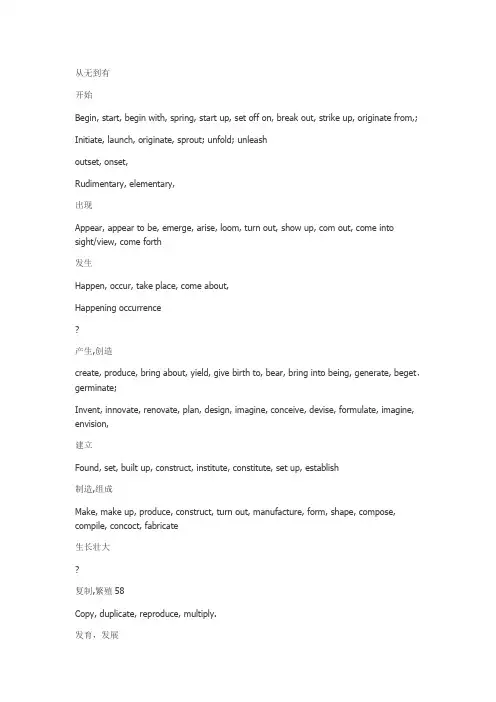
从无到有 开始 Begin, start, begin with, spring, start up, set off on, break out, strike up, originate from,; Initiate, launch, originate, sprout; unfold; unleash outset, onset, Rudimentary, elementary, 出现 Appear, appear to be, emerge, arise, loom, turn out, show up, com out, come into sight/view, come forth
发生 Happen, occur, take place, come about, Happening occurrence ? 产生,创造 create, produce, bring about, yield, give birth to, bear, bring into being, generate, beget,germinate;
Invent, innovate, renovate, plan, design, imagine, conceive, devise, formulate, imagine, envision,
建立 Found, set, built up, construct, institute, constitute, set up, establish 制造,组成 Make, make up, produce, construct, turn out, manufacture, form, shape, compose, compile, concoct, fabricate
生长壮大 ? 复制,繁殖58 Copy, duplicate, reproduce, multiply. 发育,发展 Grow, develop, breed, bring up, nurture, cultivate, hone, raise, foster, (主动) Develop, advance, progress, move forward, go forward, proceed(自我成长) Burgeon, flourish, thrive, bloom, blossom, boom, prosper; 保持,延续 Continue, last, carry on, keep on, keep, remain maintain retain Perpetuate, Persevere, stick with, insist on, persist in, Continuous, incessant, permanent, constant, steady, unbroken, perpetual, everlasting, eternal, lasting, unending, uninterrupted, undying, immortal, invariable,
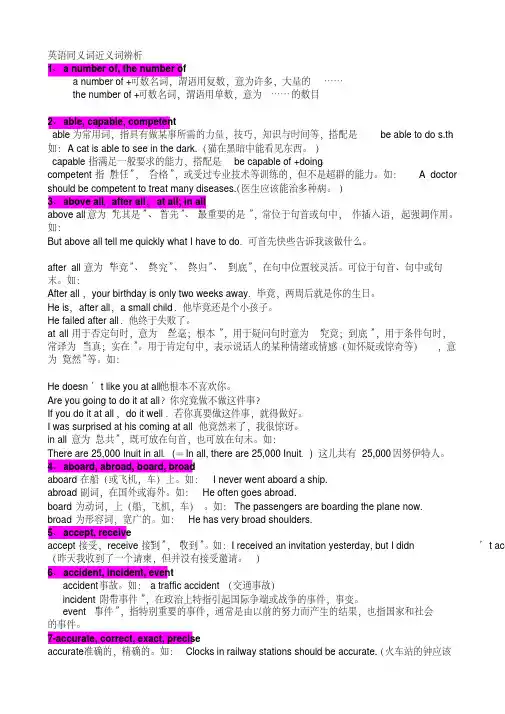
英语同义词近义词辨析1、a number of, the number ofa number of +可数名词,谓语用复数,意为许多,大量的……the number of +可数名词,谓语用单数,意为……的数目2、able, capable, competentable为常用词,指具有做某事所需的力量,技巧,知识与时间等,搭配是be able to do s.th。
如:A cat is able to see in the dark. (猫在黑暗中能看见东西。
)capable 指满足一般要求的能力,搭配是be capable of +doing。
competent 指“胜任”,“合格”,或受过专业技术等训练的,但不是超群的能力。
如: A doctorshould be competent to treat many diseases. (医生应该能治多种病。
)3、above all;after all;at all; in allabove all意为“尤其是”、“首先”、“最重要的是”,常位于句首或句中,作插入语,起强调作用。
如:But above all tell me quickly what I have to do.可首先快些告诉我该做什么。
after all意为“毕竟”、“终究”、“终归”、“到底”,在句中位置较灵活。
可位于句首、句中或句末。
如:After all,your birthday is only two weeks away.毕竟,两周后就是你的生日。
He is,after all,a small child.他毕竟还是个小孩子。
He failed after all.他终于失败了。
at all用于否定句时,意为“丝毫;根本”,用于疑问句时意为“究竟;到底”,用于条件句时,常译为“当真;实在”。
用于肯定句中,表示说话人的某种情绪或情感(如怀疑或惊奇等),意为“竟然”等。
如:.他根本不喜欢你。
小学英语常用同音词、近义词、反义词归纳一、同音词B—bee—be no—know C—see—sea hi—highI—eye for—four R—are son—sunT—tea our—hour U—you pair—pearY—why here—hear to—two—too there—theirby—bye—buy right—write red—read aren’t—aunt new—knew father—farther blue—blew who’s-whosec-see-sea b-be-bee y-whyfor-four hi-high no-know by-bye son-sun hear-here there-their dear-deerpear-pair father-fartherweight-wait it's-itswho's-whose they're-their二、近义词toilet — WC listen —hear class —lesson everyone —everybody glass —cup large —bigglad —happy like —love little —smallphoto —picture purse— wallet start —beginhome—house learn—study beautiful—prettyusually —often look —see cycle —bikenear —beside hi —hello quick —fast garden —park desk —table speak —say —talk river —lake go home —come homea moment ago— just now a lot of —lots of — manybe good at —do well in of course —sure be from —come from take a walk —go for a walktake a bus —by bus would like —want look for— find三、反义词big(大旳)----- small(小旳) bad(坏旳)----- good(好旳)bright(明亮旳)----- dark(黑暗旳) black(黑旳)----- white(白旳)beautiful(美旳)----- ugly(丑旳) cold(冷旳)----- hot(热旳)cool(凉爽旳)----- warm(温暖旳) come(来)----- go(去)cry(哭)----- laugh(笑) clever(聪颖旳)----- stupid(笨旳)different(不一样旳)-- same (相似旳) difficult(难旳)-- easy(轻易旳)dirty(脏旳)----- clean(洁净旳) day(白天)----- night(夜晚)early(早旳)----- late(迟旳) fast(快旳)----- slow(慢旳)glad(快乐旳)--- sad(悲伤旳) inside(里面旳)---- outside(外面旳)in(里面)----- out(外面) large(大旳)----- little(小旳)left(左)----- right(右) quiet(安静旳)----- noisy(吵闹旳)new(新旳)----- old(旧旳) loose(松旳)----- tight(紧旳)like(喜欢)----- hate(厌恶) open(开)----- close(关)quick(快旳)----- slow(慢旳) stand(站)----- sit(坐)short(矮旳)----- tall(高旳) short(短旳)----- long(长旳)thick(厚旳)----- thin(薄旳) thin(瘦旳)----- fat(肥旳)up(向上)------ down(向下) wrong(错旳)----- right(对旳)weak(弱旳)----- strong(强健旳) young(年轻旳)----- old(年老旳一系动词、助动词与副词旳缩写isn’t=is not can’t=can not haven’t=have not hasn’t=has not aren’t=are not don’t=do notdoesn’t=does not won’t=will not二代词与系动词旳缩写I’m=I am it’s=it is he’s=he is she’s=she is that’s=that is you’re=you are they’re=they are we’re=we are 三疑问词与系动词旳缩写Who’s=who is how’s=how is when’s=when isWhat’s=what is where’s=where is四代词与助动词旳缩写I’d=I would we’ll=we will we’ve=we havehe’s=he has小学英语反义词和对应词名词man---woman boy---girl grandpa/grandfather---grandma / grandmother father---mother uncle---aunt son---daughter brother---sister Mr---Ms/Mrs left---right day---night east---west north---south king---queen动词come--- go open---close sit---stand cry---laugh ask---answer buy - -- sell sleep-- wake take-- bringteach -- learn形容词big—small black—white fat—thin late —early long —shorttall—short bad —good happy---sad cold —hot warm—cool yes—no far —near right —wrong same —different quick / fast —slow new —old young—old cheap -- expensive/dear clean --- dirty clever --- foolish dark --- bright/l empty--- full easy --- difficult/ hard hungry---full first --- last light --- heavy poor --- richbusy —free safe -- dangerous quiet---noisy代词he---she his---her his---hers this---thatthese---those nothing---everything none---all副词和介词up---down after --- before here---there inside---outsidenow---then with -- without in---out英语单词分类一、食物和饮料( food and drink)foodhamburger sandwich cake bread hot dog rice noodlesdumpling pizza biscuit egg moon cake sweets ice cream peanuts fast food cheesemeat ———chicken fish sausagevegetables——tomato potatofruit ———apple pear banana orange mango watermelondrink water tea coke coffee juice milk soybean milk soup二、颜色(colours)white black red green yellow blue brown purpleorange pink三、家庭组员(family members)grandparents—grandpa / grandfather,grandma / grandmothergrandchildren parents—father / dad, mother / mum uncle aunt son daughter brother sister cousin四、数字(numbers)1 one2 two3 three4 four5 five6 six7 seven8 eight9 nine 10 ten 11 eleven 12 twelve 13 thirteen 14 fourteen 15 fifteen 16 sixteen 17 seventeen 18 eighteen 19 nineteen20 twenty 21 twenty-one 22 twenty- two 23 twenty- three24 twenty- four 25 twenty- five 26 twenty- six 27 twenty- seven 28 twenty- eight 29 twenty- nine 30 thirty 31 thirty- one32 thirty- two 33 thirty- three 34 thirty- four 35 thirty- five36 thirty- six 37 thirty- seven 38 thirty- eight 39 thirty- nine40 forty 41 forty- one 42 forty- two 43 forty- three44 forty- four 45 forty- five 46 forty- six 47 forty- seven48 forty- eight 49 forty- nine 50 fifty 51 fifty- one52 fifty- two 53 fifty- three 54 fifty- four 55 fifty- five 56 fifty- six 57 fifty- seven 58 fifty- eight 59 fifty- nine 60 sixty 61 sixty- one 62 sixty- two 63 sixty- three 64 sixty- four 65 sixty- five 66 sixty- six 67 sixty- seven 68 sixty- eight 69 sixty- nine 70 seventy 71 seventy- one 72 seventy- two 73 seventy- three 74 seventy- four 75 seventy- five 76 seventy- six 77 seventy- seven 78 seventy- eight 79 seventy- nine 80 eighty 81 eighty- one 82 eighty- two 83 eighty- three 84 eighty- four 85 eighty- five 86 eighty- six 87 eighty- seven 88 eighty- eight 89 eighty- nine 90 ninety 91 ninety-one 92 ninety- two 93 ninety- three 94 ninety- four 95 ninety- five 96 ninety- six 97 ninety- seven 98 ninety- eight 99 ninety- nine 100 one hundred五、职业名词( jobs )teacher pupil doctor nurse worker farmer driver dancer pilot writer singer waiter actor librarian player policeman fairman六、身体部位( body )head hair eye ear nose face mouth tooth (teeth 复)arm hand leg foot (feet 复) (shoulder, knee, toe, finger,stomach)七、运动名词(sports)football basketball table tennis baseball runningswimming skating high jump long jump skippingmorning exercises winner八、四季( seasons)spring summer autumn / fall winter九、月份( months)January February March April May June JulyAugust September October November December十、一周七天( seven days of a week)Sunday Monday Tuesday Wednesday ThursdayFriday Saturday十一、交通方式( transportation)on foot / walk by bike by bus by car by taxi by trainby ship /boat by plane十二、动物( animals)dog cat chick / hen / cock duck horse cow sheeppig monkey tiger lion elephant panda bear fish bird rabbitfrog dragon十三、天气( weather)sunny /fine cloudy windy rainy snowy cold hot warm cool十四、学习用品( school things )classroom blackboard desk chair schoolbag book pen pencil ruler eraser pencil-box dictionary exercise book newspaper timetable card picture library card十五、衣物名词( clothes )hat /cap coat dress shirt T-shirt blouse trousers skirt sock(s) shoe(s) sweater raincoat十六、公共场所( public places)school playground park zoo hospital factory library farm cinema shop supermarket airport station house restaurant square十七、感觉形容词(feeling)cold hot cool warm hungry thirsty tiredbored happy sad angry excited sick terrible十九、时间名词( time )hour morning afternoon evening night day week weekend month season year yesterday today tomorrow tonight/this evening this morning/ afternoon this year one day some day二十、家居用品room bedroom bed bathroom desk chair clock light / lamp photo lantern umbrella doorbell fridge line box bottle pocket knife bowl plate chopsticks forkshopping list stamp toothbrush TV (television) computer telephone/phone radio CD-ROM camera二十二、学科(subjects)Chinese maths English science music PE music二十三、节日(festivals)Spring Festival Mid-autumn Festival New Year’s DayDragon Boat Festival Children’s Day Teachers’ Day Chritmas二十四、特殊疑问词what —— what colour what time what dayhow —— how many how much how old how long how tallwhere when who whose why which。
张磊老师资料:常见近义词常见近义词辨析1. abandon,desert,forsake,quit都含有一定的“放弃”之意 abandon 指完全、永远地放弃, 尤指对之负有责任或义务者, 放弃一个项目或计划。
desert 强调故意违背自己的义务、责任或誓言等(擅离职守) 。
forsake 指遗弃以前所爱的人或事物, 着重于断绝情感上的依恋, e.g. forsake one's wife and children遗弃妻儿; forsake bad habits摈弃坏习惯。
quit 指突然或出其不意地放弃, 现一般指“停止” , e.g. quit work停止工作。
2. accessory,decoration,ornament 都含有一定的“装饰品”之意 accessory [常作pl.] 指 (女性的) 装饰品, (手提包, 手套, 帽子, 项链, 耳环等) 。
decoration 指为了装饰某物所使用的艳丽好看的装饰品。
orna-ment 指一般装饰品, ornament在作动词时常可和decorate互换。
3. accomplish,complete,end,finish 都含有“完成”之意。
accomplish 指成功地完成预期的计划或达到预期的目的或成果。
complete 指完成一件指派或预定的任务,或完善、完整未完成的部分。
end 指一个动作或一件事情的结束或终止。
finish 指把一件事或一个动作做完,强调事情的了结、终止。
3. accurate,correct,delicate,exact,precise都含有一定的“正确, 精确’之意。
accurate 准确的,精确的,指某人或某事不仅不出错,而且与事实无出入,强调准确性。
correct 正确的,指某人或某事合乎事实或公认的标准或规则,没有错误。
delicate 精美、精细的、雅致的。
exact 确切的、精确的, 语气较accurate强, 指某人或某事数量或质量完全符合事实或标准, 而且在细致末节上也丝毫不差。
2010考研英语总结:常见近义词辨析《2010年考研英语考试大纲解析》中明确指出:“考生应能掌握5500左右的词汇及相关词组。
除掌握词汇的基本含义外,考生还应掌握词汇之间的词义关系,如同义词、近义词、反义词等;掌握词汇之间的搭配关系,如动词与介词,形容词与介词,形容词与名词等”;掌握词汇生成的基本知识,如词源、词根、词缀等。
由此可见,同学们在复习单词时,不仅要记词更要学会去辨析,尤其对相似易混词汇应进行重点攻克。
为了方便同学们的单词归纳复习,万学海文英语教研中心现对常见近义词进行归纳讲解。
1、blunder, error, mistake这一组词都表示"错误"。
blunder n. (因为无知、疏忽犯下的)大错,愚蠢的错误。
I think that I committed a blunder in asking her because she seemed very upset by my question.这位女士由于我的问题感到很难过,我感觉到犯了一个大错。
error n.指判断、计算或行为上的错误,也指智力或道义上的错误。
The accident was the result of human error.这事故是人为的错误造成的。
mistake n.误会,误解;(粗心、遗忘所导致的)错误。
I took your bag instead of mine by mistake.我错拿了你的手提包。
2、brittle, fragile, frail, crisp, invalid都有"弱"的意思。
brittle a.易碎的,易损坏的,通常是指坚硬的东西。
The bones of elderly people become brittle and easily broken.老年人的骨头变得脆弱,很容易骨折。
fragile a.常常修饰使用时必须小心才不会破碎的东西,也引申为体弱的,虚弱的。
初中英语知识归纳近义词的用法和区别近义词是指在词义上或者语法用法上有一定相似度的词语。
在学习英语时,了解近义词的用法和区别对于提高语言表达的准确性和丰富性非常重要。
本文将对初中英语知识中常见的近义词进行归纳总结,并详细探讨它们的用法和区别。
1. ask / inquire"ask" 和 "inquire" 都表示“询问”的意思,但在用法上略有区别。
"ask" 是常用词,可以用于正式和非正式场合,一般用于对他人提出问题或请求信息。
例如:- She asked me about my favorite movie.(她问起我最喜欢的电影。
)- Can I ask you a question?(我可以问你个问题吗?)"inquire" 则更加正式和严肃,一般用于正式或商务场合。
例如:- He inquired about the price of the car.(他询问了一下汽车的价格。
)- The police are inquiring into the matter.(警方正在调查这件事。
)总结:"ask" 是更常用的词,适用于各种场合;"inquire" 则更正式,适用于商务或正式场合。
2. buy / purchase"buy" 和 "purchase" 都表示“购买”的意思,可以互相替换使用。
但从程度上来说,"purchase" 更正式,常用于商务或正式文书中。
例如:- She bought a new dress at the mall.(她在商场买了一条新裙子。
)- We purchased some office supplies for the company.(我们为公司购买了一些办公用品。
)总结:"buy" 更常用,可以适用于日常口语和非正式场合;"purchase" 更正式,适用于商务或正式写作。
英语常用同义词近义词、短语辨析1.idea, concept, conception, thought, notion, impression 这些名词均有“思想、观点、观念”之意。
idea: 最普通常用词,几乎适用于任何方面的思维活动。
concept: 指从众多实例中通过概括、归纳而形成的对事物本质、全貌及其内部联系的概念或看法。
如:A small baby has no concept of right and wrong.婴儿没有是非概念.It was Aristotle who proved the world is round. Plato popularized the concept.亚里士多德证明了地球是圆的,柏拉图普及了这一概念。
conception: (概念、观念、思想)通常指个人或一些人所持有的具体概念或念头,也可指概念的形成过程,含一定的想象和感情色彩意味。
如:He’s got a really strange conception of friendship. 他对友谊有一种非常独特的见解。
ancient Greek thought古希腊思想;lost/deep in thought陷入思索中/在沉思中,如:Derek was staring out of the window, lost in thought. Derek凝视着窗外,陷入了沉思。
thought: 指以推理、思考等智力活动为基础的心理思维活动及其结果。
如:Marxism-Leninism, Mao Zedong Thought, Deng Xiao-ping Theory,“三个代表”之英文表达法——摘自CNN'THE THREE REPRESENTS' Theory first raised by President Jiang Zemin in early 2000.Communist party must:1 - Represent most advanced productive forces, including private business. 代表中国先进社会生产力的发展要求2 - Represent the most advanced culture. 代表中国先进文化的前进方向3 - Represent fundamental interests of the broad masses (i.e. not merely a "revolutionary party" but one that stands for all Chinese.) 代表中国最广大人民的根本利益notion: 尤指错误或模糊的概念、想法;无可靠的基础,未经深思熟虑的观点。
misguided notions of male superiority男尊女卑的错误观点,突然的念头,奇想notion to do sthAt midnight she had a sudden to go to the beach.半夜里她突发奇想要去海滩。
impression: 指外部刺激在思想中所产生的印象。
尤指(对人、事的)印象;感想,常接of, 如:What’s your impression of Frank as a boss? 你对身为老板的Frank印象如何?Now I have a very different impression of England. 如今我对England的印象大不相同了。
first impression 第一印象;make an impression (on)留下好印象,如:It was their first meeting, and Richard was determined to make an impression.这是他们第一次见面,理查德决心给人留下好印象。
2.identify, recognize, make out这些动词均含“认出,识别”之意。
identify: (认出某人或某物,识别)指辨别、确定人的身份或物品的归属等。
如:The aircraft were identified as American. 那些飞机被认出是美国的。
recognize: 指所辨认的人或物多是以前所熟悉的。
如:You shouldn’t go yourself. You’ll be recognized. 你不应该亲自去,你会被人认出来的。
make out: 通常指通过人的感觉器官来辨别事物。
意思是(勉强)听出;看出,辨认出如: I can scarcely make out his writing. 我几乎辨认不出他的笔迹。
We couldn’t make out what they were talking about. 我们听不清楚他们在谈论什么。
3.idle, lazy这两个形容词均有“闲散,懒惰”之意。
idle: 通常指不忙,无事可干,一般不含应责备之意。
如:We couldn’t leave this expensive machinery lying idle.我们不能让这套昂贵的机械闲置着。
The whole team stood idle, waiting for the mechanic.整队人干站着等技工来。
lazy: 指好逸恶劳,贪闲偷懒,或不愿学习或工作等,常含应受责备之意。
the laziest boy in the class班上最懒的男孩;a lazy Sunday 令人懒洋洋的星期日I was feeling lazy so I called a taxi. 我懒得走,所以叫了出租车。
4.if, whether一、相同之处。
1.whether和if都能引导宾语从句,常置于see, ask, learn, tell, wonder, doubt, find out等动词之后。
如:He asked me whether/if I could help him. I want to know whether/if he lives there.2.whether和if都可用在it作形式主语从句中。
如:I t’s uncertain whether/if he’ll come this evening.3.在be uncertain/doubtful(不能确信,不确知某事/对。
感到怀疑)之后,常用whether引导宾语从句,有时也可以用if,如: We are uncertain whether/if Mary will come.一、引导宾语从句,一般既可用whether也可用if。
但1 or not放在whether之后时,只能用whether不用if。
I don’t know whether or not he will come. 我不知道他是不是回来。
注1:如果or not放在whether所引导的从句句尾,则可以用if来替换。
I don’t know whether/if he will come or not.我不知道他是不是回来。
2 在强调任意选择时,用whether…or,此时不用if替换whether。
He asked me whether I wanted to go there by train or by bus.他问我是想乘火车还是坐公共汽车去那里。
注:whether和or一起还有“不管”之意,引导让步状语从句。
Whether he drives or takes the train, he will be here on time.不管开车来还是乘火车来,他都会准时到。
3 虽引导宾语从句,但为了强调宾语部分,也可把从句放在句首,此时只用whether不用if。
Whether he will come I am not sure.他是不是来我拿不准。
4 从句作介词宾语时只用whether不用if。
It depends on whether it will be fine.那得看是不是晴天。
Success depends on whether we make enough effort.5 作discuss等动词的宾语时,用whether不用if。
We discussed whether we should close the shop.我们讨论是不是该关掉商店。
6 句子中有if引导的条件句,如再有表示“是否”的宾语从句,用whether不用if。
He asked me whether I’d move to New York if I got the job.他问我如果我得到那份工作是否会搬家到纽约。
7 容易产生歧义时用whether不用if来表示“是否”。
Please let me know if you need help. 如果你需要帮助请告诉我。
或:请告诉我你是否需要帮助。
对比:Please let me know if you need help.请告诉我你是否需要帮助。
8 如果宾语从句为否定句时,则只用if不用whether。
I don’t know if it won't rain tomorrow..我不知道明天是不是会下雨。
He asked me if I hadn’t finished my work.二、在引导主语从句、表语从句、同位语从句时一般用whether不用if。
如:⑴Whether it is true remains a question.(主语从句)那是不是真的还是个问题。
如: ___the 2000 Olympic Games will be in Beijing is not known yet. A.whether B.If C.Whether D.That 答案是C。
⑵The question is whether it is true.(表语从句)问题是是不是真的。
The question is whether it is not worth doing.⑶We have a doubt whether it is true.(同位语从句) 我们怀疑那是不是真的。
The question whether the students answered correctly should be decided by the teacher.注:whether引导主语从句放在主句之后时可用if来代替。
It is unclear whether/if he likes the present.他是不是喜欢那个礼物还不清楚。